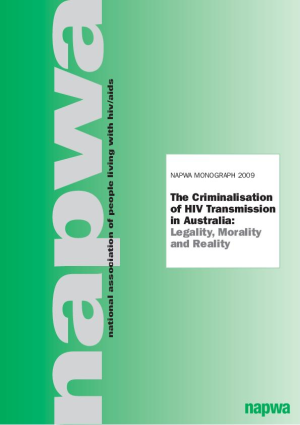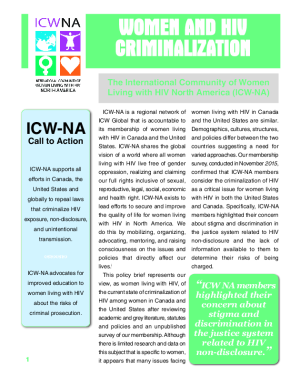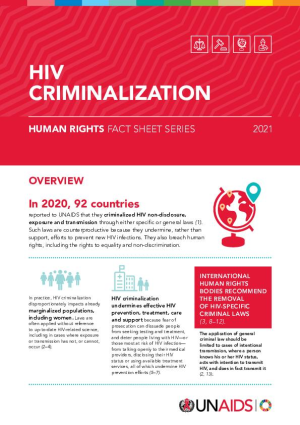Addresses the criminal prosecution of people who transmit HIV in Australia. Examines the legal, moral and ethical justification for laws criminalising HIV transmission and the impacts of criminalisation on people with HIV.
Introduction to HIV criminalisation
What is HIV criminalisation
Oslo Declaration on HIV Criminalisation
Outlines the importance of a cohesive, evidence-informed approach to use of criminal law relating to HIV non-disclosure, exposure and transmission. Urges Ministries of Health and Justice, public health officials, policymakers and criminal justice system actors to ensure a proportionate response to HIV transmission risk.
Women and HIV criminalization
This policy brief represents the view, as women living with HIV, of the current state of criminalization of HIV among women in Canada and the United States after reviewing academic and grey literature, statutes and policies and an unpublished survey of membership. ICW-NA members highlighted their concern about stigma and discrimination in the justice system related to HIV non-disclosure.
Criminalization of HIV Exposure: A Review of Empirical Studies in the United States
This review of literature identifies and describes US empirical studies on the criminalization of HIV exposure, examines findings on key questions about these laws, highlights knowledge gaps, and sets a course for future research.
Limit Cases: How and why we can and should decriminalise HIV Transmission, exposure and non-disclosure
ABSTRACT: Across the world, people living with HIV and AIDS (PLHA) face investigation, prosecution, conviction, and punishment if they transmit HIV to another person, expose others to the risk of HIV acquisition, or fail to disclose in advance their HIV positive status. This article seeks to explain why limiting the criminalisation of HIV is important and necessary; identifies some of the ways in which it has been, and might be, limited; and, finally, offers some reflections on whether there exists a principled limit to decriminalisation arguments (ie whether there are cases which, even if the general principles underpinning decriminalisation is accepted, justify state punishment). Drawing on recent international policy guidance, current scientific knowledge about HIV prevention and treatment, and research on the impact of criminalisation of PLHA, the article argues that decriminalisation is critical to eradicating HIV and should be a public health priority, that biomedical advances in prevention and treatment will assist the decriminalisation project but are insufficient in the absence of legal and criminal justice practice reform.
HIV Criminalization – Human Rights Fact sheet Series
Series of fact sheets on human rights highlighting the critical need to scale up action on rights. Short, easy to digest and accessible document outlining the latest epidemiology, the evidence of the impact of human rights interventions, the latest targets, and international guidelines, recommendations and human rights obligations.
Other factsheets in the same series released in June 2021 include: HIV and people who use drugs, HIV and gay men and who have sex with other men, HIV and transgender and other gender-diverse people, HIV and sex work, HIV and people in prisons and other closed settings and HIV and stigma and discrimination.





